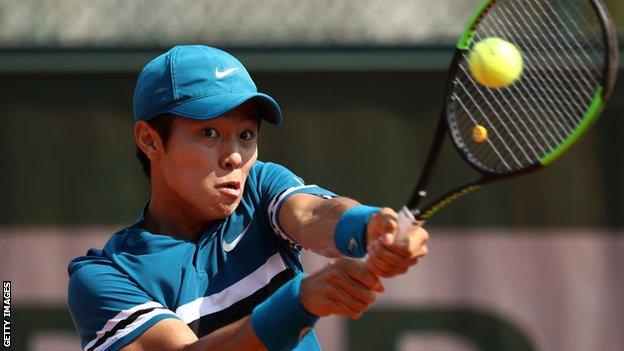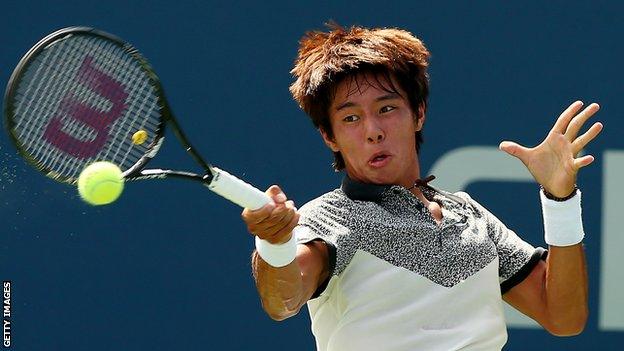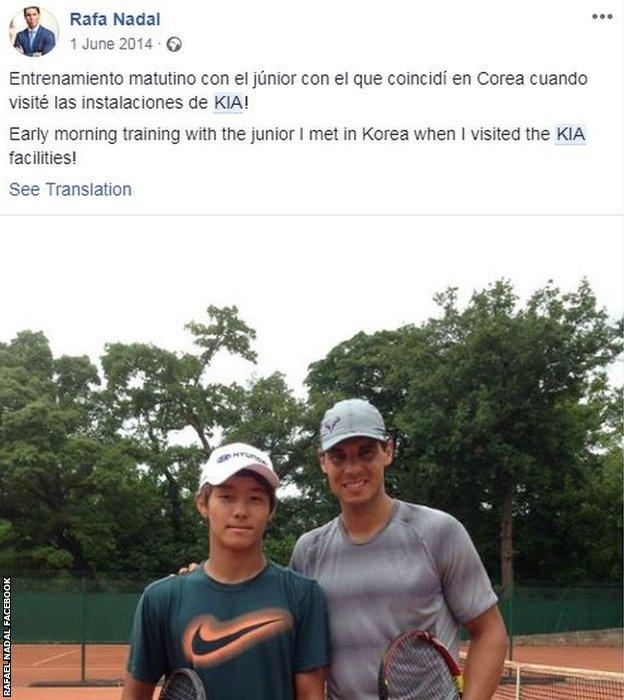Wimbledon 2018: Deaf player Lee Duck-hee aiming to qualify
- Published

Deaf tennis player Lee Duck-hee is chasing his dream of Wimbledon qualification this week
Wimbledon Qualifying 2018 on the BBC |
|---|
Venue: Bank of England Sports Centre, Roehampton Dates: 25-28 June |
Coverage: Watch live on BBC BBC Red Button, Connected TVs and the BBC Sport website and app. |
Imagine the "thwack" of the racquet hitting the ball, the line judge calling "out", the umpire declaring "deuce" and the crowd clapping and cheering.
And now imagine being a professional tennis player and not hearing any of it.
That is the reality for South Korean player Lee Duck-hee, who is deaf and is hoping to qualify for the main draw at next week's Wimbledon.
"I'm very proud of myself as being the only deaf professional tennis player in the world at the moment," the 20-year-old told BBC Sport.
"I feel huge responsibility that my every step as a tennis player will influence other deaf people. I hope my career could give them a hopeful message that they could also overcome their disability and make their dream come true."
Lee, who observes the way opponents swing for the ball as a way of reading the game and whose matches have been thrown off course because he has been confused by officials' hand signals, reached a career-high ranking of 130 in April 2017.
Now ranked 233, he has come agonisingly close to Grand Slam main draws, reaching the final round of qualifying at the French Open last month where he had two match points before losing in a third set tie-break.
This week he takes part in the Wimbledon qualifying event at Roehampton, where he begins his campaign on Monday against Hungary's Attila Balazs and needs to win three matches to reach the tournament at the All England Club.
How does he do it?

Lee, here at the 2014 US Open junior event, made his debut on the professional ITF Futures Tour at the age of 14
From the moment he picked up a racquet at the age of seven because he had seen his cousin playing, Lee sought inventive ways to read the game he could not hear.
He has said in the past that he was told he could never be a great player because he was deaf and that he sometimes felt like quitting but also wanted to prove the doubters wrong.
"I focus on watching and expecting the opponent's swing and movement, which needs very intensive concentration of my eyes and fast decision-making for the next move," he said.
"I try to watch other players' matches on websites as much as possible when I have spare time - I need image training because it gives better understanding than giving me verbal coaching."
Lee has not learnt sign language, so lip reads officials or looks at their hand signals - with often confusing and frustrating results.
"Sometimes, I could not recognise whether it is 'let' or not because I cannot hear the sound from the net or the chair umpire's call, which leads to me missing the first serve," he said.
"I rely on umpires' hand signals, but they also sometimes give me a hard time when their hand signals differ from country to country, which often has influence on the match results.
"I could communicate simple English through lip-reading with other players. However, it is impossible for me to communicate with ATP officials and referees when there is need for long conversation."
In the case of this interview, he has provided written responses through a translator.
Not hearing the crowd - a possible advantage?
Playing in front of a partisan crowd, there could be times when a player would really rather not hear the boos.
"I think blocking out all potential distractions can be an advantage," said tennis coach Judy Murray, mum of two-time Wimbledon champion Andy.
And what about facing a deaf player on the other side of the net?
"It is possible playing an opponent who has a disability can be a distraction," said Murray.
She has coached deaf players in the past and says it required her to take different approach.
"One of the biggest things I learned was to not shout instructions whether they were looking at me or if they had their back to me," said Murray, who was speaking as part of UK Coaching's Coaching Week earlier this month.
"You get used to shouting the length of the tennis court, which is quite a big space but it helped me understand the impact of a really good demonstration."
Match officials also need to adapt when making the calls.
"Deaf players are constantly looking at the umpire for scores and constantly checking the scoreboard," line judge David Bayliss told BBC Sport.
"But there are problems, if you have a net on serve they don't always hear it and the umpire has to try and stop the rally.
"And of course the player is focused, they are still watching the ball and still playing that point."
Will Lee ever achieve his Grand Slam dream?

Lee says he has three "short-term" goals - breaking into the top 100, winning a Challenger title, and gaining direct entry to the main draws of ATP and Grand Slam tournaments.
"Whenever I step on the court, I feel great," he said.
"Also, I am curious about the feeling of becoming a champion of Grand Slam. I strongly believe that a day when I become a champion of a major tournament is coming if I keep up training and my skills improve."
He says his greatest achievement so far was reaching the final of the Kaohsiung Challenger in 2016, where he lost to Chung Hyeon - who reached the semi-finals of the Australian Open this year and is ranked 20th in the world.
He dreams of one day playing against former world number ones Roger Federer or Rafael Nadal, who has praised him for his "strong determination and mental toughness".
Lee says the Spaniard invited him to practise with him at the French Open in 2014 and "couldn't believe it" when he was first made aware of the South Korean.
Judy Murray says she first saw Lee at the Australian Open in the juniors a couple of years ago and thinks he will be a great role model for other deaf players.
"He plays incredibly well," she said.
"Disability is not about what you can't do, but what you can do.
"Clearly he had a huge talent and was not letting the fact that he couldn't hear have any impact on where he wanted to go with his game and that was wonderful to see."